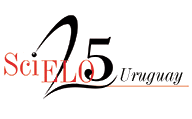The Church and the history of the Uruguayan Catholic nation at the beginning of the 20th century
DOI:
https://doi.org/10.25185/14.3Keywords:
History, Church, Catholic nation, StateAbstract
This article analyzes the idea of the nation and the State held by the Catholic Church between 1900 and 1930. For that purpose, the ecclesiastical discourses on the origins of the nation and the organization of the state are addressed in light of the particular tensions that the Church and the Uruguayan State went through at the beginning of the century. The sources for this research are the History manuals written by Brother Damascene (BD) and the archiepiscopal guidelines published in the Ecclesiastical Bulletin of the Archdiocese of Montevideo (in Spanish). The article seeks to reconstruct the meanings of a Catholic nation and a tutelary State from the conditioning that the secularization process caused in the Church. The proposal aims at an inter-discursive study that allows a comparative reading of the themes and approaches recovered by the authors in order to achieve recognition of the ecclesiastical institution in the face of the new legal reality that emerged in 1919.
Downloads
References
Achigar, Néstor, Varela Brown, Hugo y Eguren, Beatriz. Hermano Damasceno. Un aporte a la cultura uruguaya. Montevideo: Colegio Sagrada Familia, 2011.
Ayrolo, Valentina. Funcionarios de Dios y de la República. Clero y política en la experiencia de las autonomías provinciales. Buenos Aires, Biblos, 2007.
Brandon, Yanelin, “¿Libertad de enseñanza? ¿Atentado contra la libertad de conciencia? Discusiones parlamentarias en torno al uso de los manuales del Hermano Damasceno en las aulas laicas del Uruguay de primera mitad del siglo XX”, Revista Estudios, N°42 (2019), 31 – 50
https://revistas.unc.edu.ar/index.php/restudios/article/view/25129 Consultado: 10/agosto/2023.
Caetano, Gerardo, “Notas para una revisión histórica sobre la cuestión nacional”, Revista de Historia, N° 3, 1992.
Caetano, Gerardo, Geymonat, Roger. La secularización uruguaya (1859 – 1919). Catolicismo y privatización de lo religioso. Montevideo: Taurus, 1997.
Caetano, Gerardo, coord. Los uruguayos del centenario. Nación, ciudadanía, religión y educación (1910 - 1930). Montevideo, Taurus, 2000.
Chartier, Roger. El mundo como representación. Barcelona: Gedisa, 1992.
Da Costa, Néstor, Maronna, Mónica, cien años de laicidad en el Uruguay. Debates y procesos (1934 – 2008). Montevideo: Planeta, 2019.
Di Stefano, Roberto, Zanatta, Loris, Historia de la iglesia argentina desde la conquista hasta fines del siglo XX. Buenos Aires, Editorial Sudamericana, 2009.
Escolano Benito, Agustín, “El manual escolar y la cultura profesional de los docentes”, Revista Tendencias Pedagógicas, Vol. 14, 2009, pp. 169-180. https://revistas.uam.es/tendenciaspedagogicas Consultado: 1/diciembre/2022.
Islas, Ariadna. La liga patriótica de enseñanza. una historia sobre ciudadanía, orden social y educación en el Uruguay (1888-1898). Montevideo: EBO, 2009.
Leone, Verónica, “Periodismo católico en Uruguay”, en: Diccionario de Historia cultural de la Iglesia en América Latina.
https://www.dhial.org/diccionario/index.php/PERIODISMO_CAT%C3%93LICO_EN_URUGUAY Consultado: 9/agosto/2023.
Maiztegui Casas, L., “El Hermano Damasceno: un pedagogo francés para la historia uruguaya”, en: Revista Prisma N° 20, Montevideo, UCUDAL, 2005.
Monreal, Susana. “Libertad de enseñanza en Uruguay. Cuestionamientos y debates (1868 − 1888)”. Ariadna histórica. Lenguajes, conceptos, metáforas, N° 5 (2016): 127 - 150. https://ojs.ehu.eus/index.php/Ariadna/article/download/16076/Monreal/63177 Consultado: 9/agosto/2023.
Pivel Devoto, J.E., “De los catecismos históricos al Ensayo de HD, HD el viejo maestro y La consagración pedagógica de HD”, en: Marcha, 24, 31/mayo y 7/junio de 1957.
Sansón, Tomás, La construcción de la nacionalidad oriental. Estudios de historiografía colonial. Montevideo: UDELAR-FHUCE, 2006.
Published
How to Cite
Issue
Section
License
Copyright (c) 2023 Yanelin Brandon

This work is licensed under a Creative Commons Attribution 4.0 International License.



























 This work is under a
This work is under a 